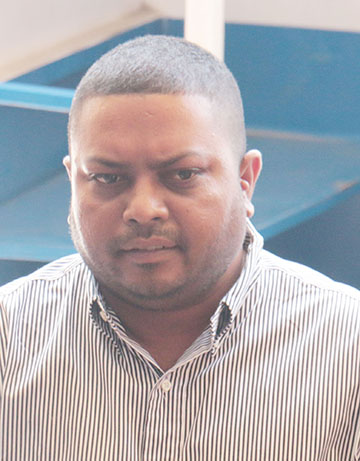A Board of Inquiry will be set up to investigate recent claims made by self-confessed drug trafficker Barry Dataram of the alleged involvement of the Customs Anti-Narcotic Unit (CANU) in the drug trade and corruption, President David Granger revealed today.
The president was at the time responding to questions posed by members of the media moments after Chief Justice (ag) Yonette Cummings-Edwards was sworn in as a member of the Judicial Service Commission (JSC).

Granger in offering a comment on Dataram’s allegations which were aired by HGPTV Channel 67’s Nightly News on Monday night said that a decision was made by the members of the National Security Committee (NSC) to set up a Board of Inquiry.
He reminded the media that last July government had set up the NSC and the members meet every week to examine security issues. He said that the matter concerning Dataram came before the Committee during its meeting on Tuesday and it decided that a Board of Inquiry would be convened under an officer to be named. That inquiry, he said, will determine the “veracity of the information” which was broadcast.
“Yes we are convening an inquiry to investigate the allegations which were made”, he said adding that the officer will be given Terms of Reference to investigate the allegation which have been reported in the press about the alleged improper behaviour of officers of the state.
Dataram, who said he is a businessman, during the interview accused a high ranking CANU official of being involved in the drug trade and added that the rank would take as much as $10 million to allow cocaine to leave the country. He said that drug lords would pay $5 million before the shipment and the remaining would be paid after the shipment. Dataram admitted that he is involved in the drug trade but said he has never been convicted on a criminal charge.
Dataram also alleged that the majority of the drugs that is seized by CANU returns to the streets. He said that he knew of this because of his involvement and his friends’ involvement in the trade.
“I know what is going on in the streets… I know what is going on in CANU… them is the enemies and they have to know that just like how they got things on me I get things on them,” he said.
CANU’s head James Singh has since denied the allegations and called on Dataram to provide sworn statements for past and ongoing investigations.
Singh in his response suggested a link between Dataram’s allegations and what it considered to be his “unease” over the commencement of his trial for the alleged possession of a large quantity of cocaine that was found concealed in shrimp at his Diamond house.
Dataram, his wife and two friends, who were held during a raid of the Diamond Housing Scheme property, are charged with possession of 284 pounds of cocaine for trafficking.
Asked what will be government’s actions if anyone is found culpable, Granger responded that the law would be allowed to take its course.
“Well we will deal with the culpable in a way that we always deal with the culpable. We expect there will be due process, if the person alleged to have committed offences…if there is a case to answer we will ensure that the person after proper investigation is put before the court but we don’t interfere in the judicial process. Once we feel there is a case to answer we will refer the case to the authorities and the law will take its course. We are not persecuting anybody but we just want to know the facts and we will take it from there”, he told reporters.
Dataram’s confessions and revelations are the most recent coming from a person linked to the underworld. Former policeman and bodyguard Sean Hinds last year during an interview with the very television newscast had confessed to being a member of the death squad. He also leveled allegations of corruption and unprofessional conduct against the police. He went as far as implicating a now retired senior cop in the 2006 murder of journalist and television talk show host Ronald Waddell. He was later detained by the police for questioning but refused to cooperate with investigators.
Later, police foiled his attempt to leave Guyana via the Suriname ‘back track’ route.
